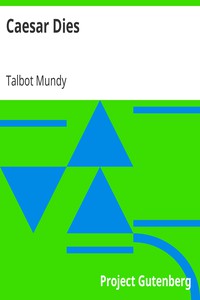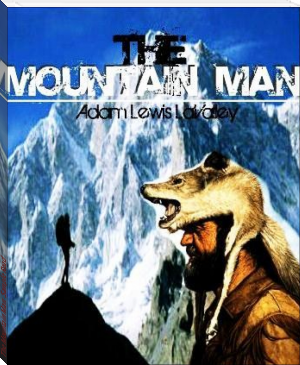Caesar Dies, Talbot Mundy [top reads TXT] 📗

- Author: Talbot Mundy
Book online «Caesar Dies, Talbot Mundy [top reads TXT] 📗». Author Talbot Mundy
"Well done!" Commodus exclaimed and smote him on the skull so fiercely that he broke the sword-stick. "You have killed him," said a senator as two men promptly seized the victim's arms to drag him out.
"Possibly," said Commodus. "That blow I landed on him would have killed a horse. But he is fortunate. He dies proud—prouder than you ever will, Varronius! He got past Paulus' guard! Would you like to attempt it? Woman! How I loathe you soft, effeminate, sleek senators! You fear death and you fear life equally! Where is Narcissus? Where are those men who are to try to kill me at my birthday games?"
There was no answer from Narcissus. Commodus forgot him in a moment, called for javelins and hurled them at a target, then at half-a-dozen targets, hitting all six marks exactly in the middle as he spun himself on one heel.
"I am in fettle!" he exclaimed, clapping the back of the senator whom he had scurrilously insulted a moment ago. If he was conscious of applause from the group of courtiers and gladiators he gave no sign of it. What pleased him was his own ability, not their praises.
"Lions!" he said. "Loose that big one!"
"Paulus," a scarred veteran answered (they were all forbidden to address him by any other name in that arena), "you have ordered us to keep that fellow for the birthday games. If you keep killing all the best ones off at practise, what shall we do when the day comes? The last ship- load has arrived from Africa and already you have used up nearly half of them. There is no chance of another cargo arriving in time for the games. And besides, we have lacked corpses recently; that big one hasn't tasted man's flesh. He is hungry now. He will eat whatever we throw in, so let him taste the right meat that will make him savage."
"Loose a leopard then."
The veteran went off without a word to give his orders to the men below- ground, whose duty it was to drag the cages to the openings of tunnels in the masonry through which the animals emerged into the sunlight. There were ten such openings on either side of the arena, closed by trapdoors, set in grooves, that could be raised by ropes from overhead.
Commodus picked up one javelin and poised it. Half-a-dozen gladiators watched him, paying no attention to the doors, through any one of which the animal might come. They knew their Paulus, and were trained, besides, to look at death or danger with a curious, contemptuous calm. But the courtiers were nervous, grouping themselves where the sunlight threw a V-shaped shadow on the sand, as if they thought that semi- twilight would protect them.
A wooden door rose squeaking in its grooves but Commodus kept his back toward it.
"Women!" he exclaimed.
His sudden scowl transformed his handsome face into a thing of horror. He began to mutter savagely obscene abuse. A leopard crept into the sunlight, tried to turn again but was prevented by the closing trap, and crouched against the arena wall.
"Beware! The beast comes!" said a gladiator.
"Hold your presumptuous tongue, you slave-born rascal!" Commodus retorted. "Take that yapping dog away and have him whipped!"
A man stepped from the entrance gate to beckon the offending gladiator, who walked out with a look of hatred on his face. He paused once, hesitating whether to ask mercy, and thought better of it, shrugging his fine bronzed shoulders. The leopard left the wall and crept toward the center of the sand, his black and yellow beauty rippling in the sunlight and his shadow looking like death's trailing cloak. The courtiers seemed doubtful which of the two beasts to watch, leopard or emperor.
"A spear!" said Commodus. A gladiator put it in his hand.
"Varronius! It irks me to have cowards in the senate! Let me see you try to kill that leopard!"
Decadent and grown effeminate though Rome was, there was no patrician who had not received some training in the use of arms. Varronius took the spear at once, his white hands closing on the shaft with military firmness. But his white face gave the lie to the alacrity with which he strode out of the shadow.
"Kill him, and you shall have the consulate next year!" said Commodus. "Be killed, and there will be one useless bastard less to clutter up the curia!"
A flush of anger swept over the senator's pale face. For a moment he looked almost capable of lunging with the spear at Commodus—but Commodus was toying with the javelin. Varronius strode out to face the leopard, and the lithe beast did not wait to feel the spear-point. It began to stalk its adversary in irregular swift curves. Its body almost pressed the sand. Its eyes were spots of sunlit topaz. Commodus' frown vanished. He began to gloat over the leopard's subtlety and strength.
"He is a lovelier thing than you, Varronius! He is a better fighter! He is manlier! He is worth more! He has kept his body stronger and his wits more nimble! He will get you! By the Dioscuri, he will get you! I will bet a talent that he gets you—and I hope he does! You hold your spear the way a woman holds a distaff—but observe the way he gathers all his strength in readiness to leap instantly in any direction! Ah!"
The leopard made a feint, perhaps to test the swiftness of the spear- point. Leaping like a flash of light, he seemed to change direction in mid-air, the point missing him by half a hand's breadth. One terrific claw, outreaching as he turned, ripped open Varronius' tunic and brought a little stream of crimson trickling down his left arm.
"Good!" Commodus remarked. "First blood to the braver! Who would like to bet with me?"
"I!" Varronius retorted from between set teeth, his eyes fixed on the leopard that had recommenced his swift strategic to-and-fro stalking movement.
"I have betted you the consulship already. Who else wants to bet?" asked Commodus.
Before any one could answer the leopard sprang in again at Varronius, who stepped aside and drove his spear with very well timed accuracy. Only force enough was lacking. The point slit the leopard's skin and made a stinging wound along the beast's ribs, turning him the way a spur-prick turns a horse. His snarl made Varronius step back another pace or two, neglecting his chance to attack and drive the spear-point home. The infuriated leopard watched him for a moment, ears back, tail spasmodically twitching, then shot to one side and charged straight at the group of courtiers.
They scattered. They were almost unarmed. There were three of them who stumbled, interfering with each other. The nearest to the leopard drew a dagger with a jeweled hilt, a mere toy with a light blade hardly longer than his hand. He threw his toga over his left forearm and stood firm to make a fight for it, his white face rigid and his eyes ablaze. The leopard leaped—and fell dead, hardly writhing. Commodus' long javelin had caught him in the middle of his spring, exactly at the point behind the shoulder-bone that leaves a clear course to the heart.
"I would not have done that for a coward, Tullius! If you had run I would have let him kill you!"
Commodus strode up and pulled out the javelin, setting one foot on the leopard and exerting all his strength.
"Look here, Varronius. Do you see how deep my blade went? Pin-pricks are no use against man or animal. Kill when you strike, like great Jove with his thunderbolts! Life isn't a game between Maltese kittens; it's a spectacle in which the strong devour the weak and all the gods look on! Loose another leopard there! I'll show you!"
He took the spear from Varronius, balanced it a moment, discarded it and chose another, feeling its point with his thumb. There was a squeak of pulleys as they loosed a leopard near the end of the arena. He charged the animal, leaping from foot to foot. He made prodigious leaps; there was no guessing which way he would jump next. He was not like a human being. The leopard, snarling, slunk away, attempting to avoid him, but he crowded it against the wall. He forced it to turn at bay. No eye was quick enough to see exactly how he killed it, save that he struck when the leopard sprang. The next thing that anybody actually saw, he had the writhing creature on the spear, in air, like a legion's standard.
Then the madness surged into his brain.
"So I rule Rome!" he exclaimed, and threw the leopard at the gladiators' feet. "Because I pity Rome that could not find another Paulus! I strike first, before they strike me!"
They flattered him—fawned on him, but he was much too genuinely mad for flattery to take effect. "If you were worth a barrelful of rats I'd have a senate that might save me trouble! Then like Tiberius I might remain away from Rome and live more like a god. I've more than half a mind to let my dummy stay here to amuse you wastrels!" He glanced up at the box, where his substitute lolled and yawned and smiled. "All you degenerates need is some one you can rub yourselves against like fat cats mewing for a bowl of milk! By Hercules, now I'll show you something that will make your blood leap. Bring out the new Spanish team."
With an imperious gesture he sent senators and gladiators to scatter themselves all over the arena. Not yet satisfied, he ordered all the guards fetched from the tunnel and arranged them in a similar disorder, so that finally no stretch of fifty yards was left without a man obstructing it. There was no spina down the midst, nor anything except the surrounding wall to suggest to a team of horses which the course might be.
"Let none move!" he commanded. "I will crush the foot of any man who stirs!"
Attendants, clinging to the heads of four gray stallions that fought and kicked, brought out his chariot and others shut the gate behind it. Commodus admired the team a minute, then examined the new high wheels of the gilded chariot, that was hardly wider than a coffin—a thing that a man could upset with a shove and built to look as flimsy as an egg shell. Suddenly he seized the reins and leaped in, throwing up his right hand.
If he could have ruled his empire as he drove that chariot he would have far outshone Augustus, for whose memory men sighed. He managed them with one hand. There was magnetism sent along the reins to play with the dynamic energy of four mad stallions as gods amuse themselves with men. If empire had amused him as athleticism did there would have been no equal in all history to Commodus.
In a chariot no other athlete could have balanced, on a course providing not one unobstructed stretch of fifty yards, he drove like Phoebus breaking in the horses of the Sun, careering this and that way, weaving patterns in among the frightened men who stood like posts for him to drive around. He missed them by a hand's breadth—less! He took delight in driving at them, turning in the last half-second, smiling at a blanched





Comments (0)